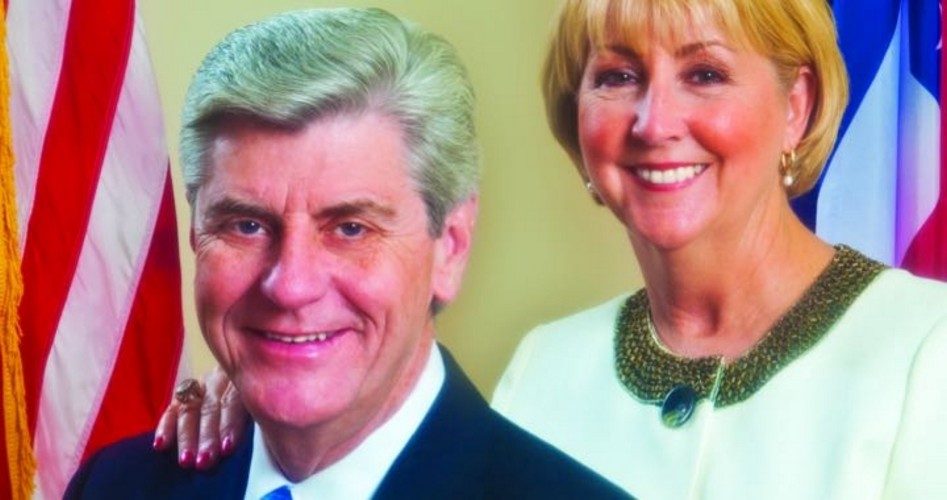
Mississippi Governor Phil Bryant (shown on left) signed a bill on March 19 to prohibit abortion after 15 weeks of pregnancy. Soon after signing the bill, the governor tweeted: “I was proud to sign House Bill 1510 this afternoon. I am committed to making Mississippi the safest place in America for an unborn child, and this bill will help us achieve that goal.”
However, the day after Bryant signed the bill into law, U.S. District Judge Carlton Reeves, in response to a lawsuit file by Mississippi’s only operating abortion clinic — Jackson Women’s Health Organization — granted the clinic’s request for a temporary restraining order to block the law during the upcoming legal battle.
House Speaker Philip Gunn was present when Bryant signed the bill into law. Gunn told the Associated Press he is proud that Mississippi is taking steps to protect “the most vulnerable of human life”— the unborn.
The bill will create the earliest ban on abortion in any state in the United States and will push back Mississippi’s current limit by five weeks. It was set to take effect immediately.
House Bill 1510 does make exceptions when there are risks to the life or physical health of the mother, or fatal fetal anomalies.
Pro-abortion advocates have said the new law targets Mississippi’s only abortion provider, the Jackson Women’s Health Organization, which performs abortions for up to 16 weeks after conception.
Though the passage and signing of House Bill 1510 was hailed as a victory by pro-lifers, only six hours afterward the Jackson Women’s Health Organization filed a lawsuit and U.S. District Judge Carlton Reeves set a March 20 hearing to consider honoring the abortion provider’s request that he impose a temporary restraining order blocking implementation of the new law.
An AP report said that abortion opponents have sought the legal confrontation, hoping that federal courts will ultimately prohibit abortions before an unborn child is viable. Current federal law blocks such restrictions by states. “We’ll probably be sued in about half an hour,” Bryant said to laughter from supporters as he signed the bill. “That’ll be fine with me. It’ll be worth fighting over.”
The Jackson Women’s Health Organization was assisted by the pro-abortion Center of Reproductive Rights in filing its lawsuit. The suit was filed in the U.S. District Court for the Southern District of Mississippi and listed both the Jackson Women’s Health Organization and the abortion provider’s resident physician, Dr. Sacheen Carr-Ellis, as plaintiffs. The defendants were listed as Dr. Mary Currier, the State Health Officer of the Mississippi Department of Health; the Mississippi State Board of Medical Licensure; and Dr. Kennth Cleveland, the executive director of the Mississippi State Board of Medical Licensure.
The lawsuit stated that the plaintiffs were bringing “this civil rights action under the United States Constitution and U.S.C. § 1983 to challenge the constitutionality of House Bill 1510.” (Section 1983 establishes a cause of action for any person who has been deprived of rights secured by the Constitution or laws of the United States by a person acting under color of state law.)
The suit asserts: “Under decades of United States Supreme Court precedent, the state of Mississippi cannot ban abortion prior to viability, regardless of what exceptions are provided to the ban.”
At the conclusion of its arguments, the plaintiffs requested that the court:
1. Issue a declaratory judgment that the Act is unconstitutional as applied to previability abortions under the liberty and equal protection clause of the Fourteenth Amendment to the United States Constitution and in violation of 42 U.S.C. § 1983.
2. Issue preliminary and permanent injunctive relief restraining the Defendants their employees, agents, and successors from enforcing the Act as to pre-viability abortions.
“The Supreme Court says every woman has a constitutional right to ‘personal privacy’ regarding her body,” Reeves wrote in his decision that quoted from the Supreme Court’s 1973 Roe v. Wade ruling that banned states from outlawing abortion.
“That right protects her choice ‘to have an abortion before viability.’ States cannot ‘prohibit any woman from making the ultimate decision’ to do so.”
Reeves stated in court that the “ultimate question” is whether a state can ban abortion before viability. He asked: “Does the state have the right to trump the woman’s right to have control over her decisions, over her body?”
Reeves did not rule from the bench but granted the temporary restraining order about an hour later. He noted that lawyers for the clinic said a woman who is at least 15 weeks pregnant was scheduled to have an abortion on the afternoon of March 20. His order, therefore, will have the immediate effect of allowing the clinic to end the life of an unborn baby.
Related articles:
Mississippi Governor Indicates He Will Sign 15-week Abortion Ban
V.P. Mike Pence: Legal Abortion Will End in America
Three-quarters of Americans Support “Significant” Abortion Restrictions
Texas Abortion Clinics Still Open Despite Numerous Safety Violations



